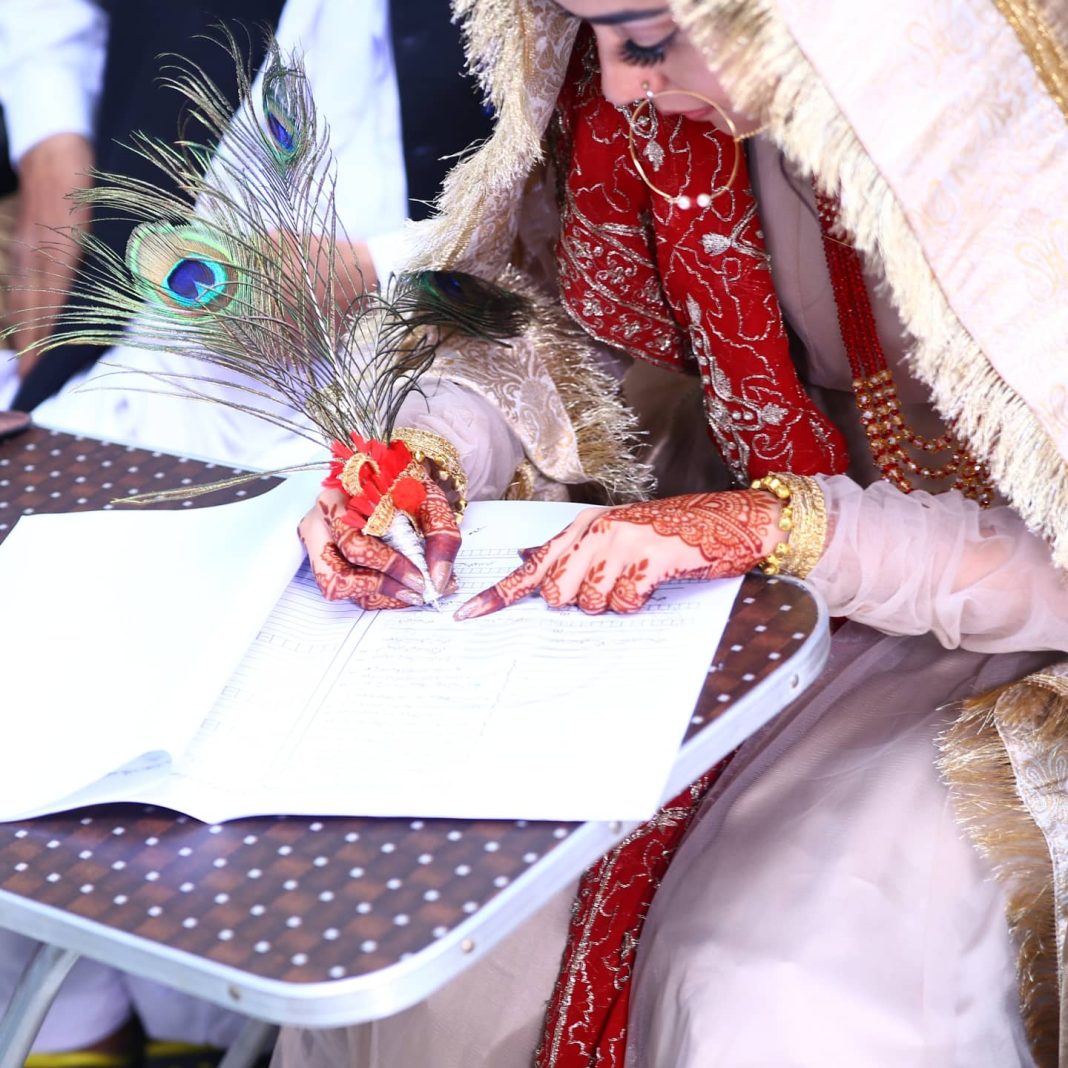PAKISTAN. Lahore. 2020 is a big year for 22-year-old Maahin Zafar. She was married in May, is in her final year of law school, and has become an inspiration for young Muslim women across the world.
Islamic Marriage Contract. Although marriage is a cornerstone of Islamic life, it is a civil affair, overseen mostly by the male elders in the family and community. Preceding the ceremony itself is the requirement of signing the nikah nama, a document that outlines the rights and responsibilities of the husband and wife. The provisions include basic legal information, such as the bride and groom’s names, names of witnesses, amount of mahar (dowry), and other such legal information. In many traditional families, the bride doesn’t even see the provisions in the contract, and a male representative (wali) will sign on her behalf.
As a law student, Maahin understood the weight of a contract, and she was adamant about making her nikah nama a reflection of her and her fiancé’s values rather than those of “a culture which asks you to bow down to the patriarchal norms.”
Muslim Bride Takes Ownership of Her Future. Determined to “set a precedent for upcoming brides,” Maahin “filled [the] nikah nama [herself].” In a Facebook post that has reached thousands in just days, Maahin wrote, “I refused to be sitting on the sofa with a red dupatta on my head while the males did all the work [writing the document].” Of special interest to Maahin were clauses 18-19, determining who has the legal right to initiate divorce proceedings. Divorce is allowed under Islamic law; however, traditionally, it is the husband who has sole privilege to file for divorce.
“I did not disagree with the nikah contract. Usually a clause about delegated divorce is struck out completely, assuming that the bride would not take that right. But I wanted to have that right. I wanted to put an end to the practice of that clause being crossed out already,” Maahin said in our interview.
Maahin emphasized that taking control of her decision to choose divorce if needed was not only for her empowerment, but to be an example for other Muslim women. “It’s a cultural thing which binds women to live lives with their toxic husbands. In our society, women are responsible for sustaining the marriage. So the culture stops women from stepping out of the marriage. It’s not the law or religion. Mentality needs to change. The burden of sustaining the marriage must be on both sides. It’s unfair. We need to put an end to this norm.”
Backlash. Maahin’s willingness to assert her rights has not come without a cost. “People called it a drama. An act. That I wanted to seek attention. That I wanted to look cool. That I wanted to bring my family’s name down. That I am disrespectful towards the ‘modest’ culture. That it was a stunt. That my husband is doomed because he has got a wife who knows her rights…They also believe that a woman who speaks up for herself is incapable of loving a man. But you know what? Standing up for my rights was something that I will never let go of, I will keep doing it, regardless of the criticism.”
Although she acknowledges that she had the support of her mother and her fiancé, she urges even women who face discrimination in their families, for whom the consequences could be financial and social isolation, to stand up and defend their rights. Maahin insists, “I know many women [who] don’t rebel. Even if they do, their voices are shunned. They are labelled as disobedient. Even if the risks are severe, they are required to deal with it. Women not speaking up for themselves sometimes end up in ugly situations where they have to suffer a lot. It’s very important to speak up for yourself, regardless of the backlash.”
Facing the Patriarchy with Courage. This kind of courage to face down decades of legal precedent (since the 1961 Muslim Family Laws Ordinance) and hundreds of years of tradition is required, in Maahin’s view, to bring about fundamental change in society. Asked what motivated this strength of will in the face of criticism, Maahin shared, “A very close friend was abused by her husband physically. And that was it. That was the moment when I thought to myself that I would do everything that I can to put an end to this brutality which is normalized in our system.”
With an eye toward the future, she is optimistic. “I’m so happy to say that our society is finally progressing. We still have a long way to go though. These small incidents like that of mine, these are just baby steps. We have to give sacrifices. We have to face the backlash. But we must stand firm on our ground. We must not let other people tell us how we should live our lives. Pakistan’s society is progressing, slowly such things will start becoming popular. We’ll see more girls standing up for their rights. We’ll see norms changing. We’ll see our society heading towards a more kind and compassionate community.”
A Role Model. Embracing her responsibility as a role model, Maahin offered this advice to other young women about empowering themselves: “Take charge of your life. Take charge of decisions that affect you. Just take charge. Be responsible. Make mistakes. Learn from them. Move on. Women have to take responsibility. They have to be independent mentally. Only then will they be able to make right decisions for themselves. Don’t pay attention to the toxic culture around you. Be on the right path even if it means standing alone.”
About to step out of law school and into the practice of law, Maahin has chosen contract law. She finds it “interesting.”



